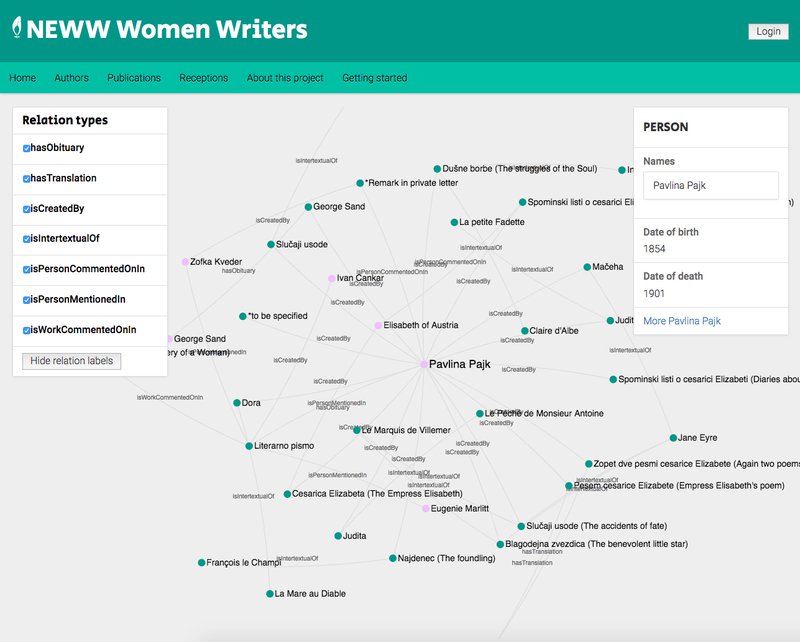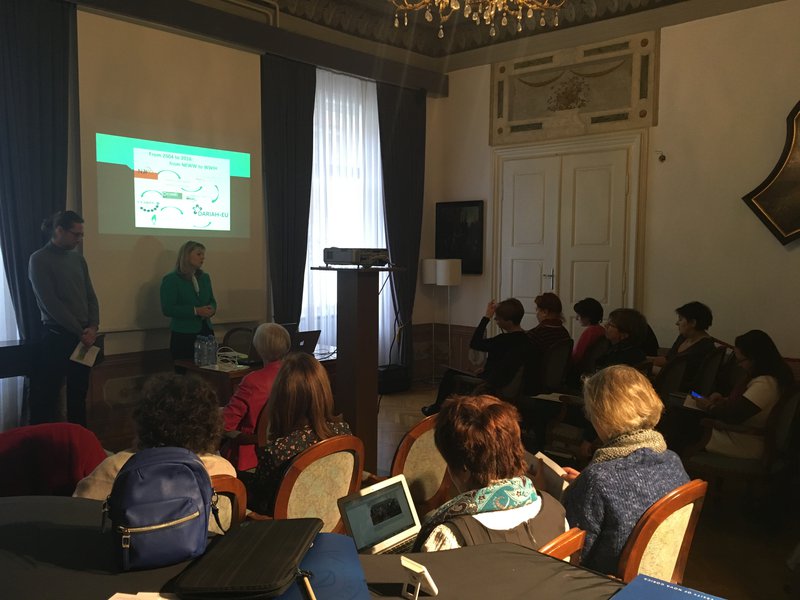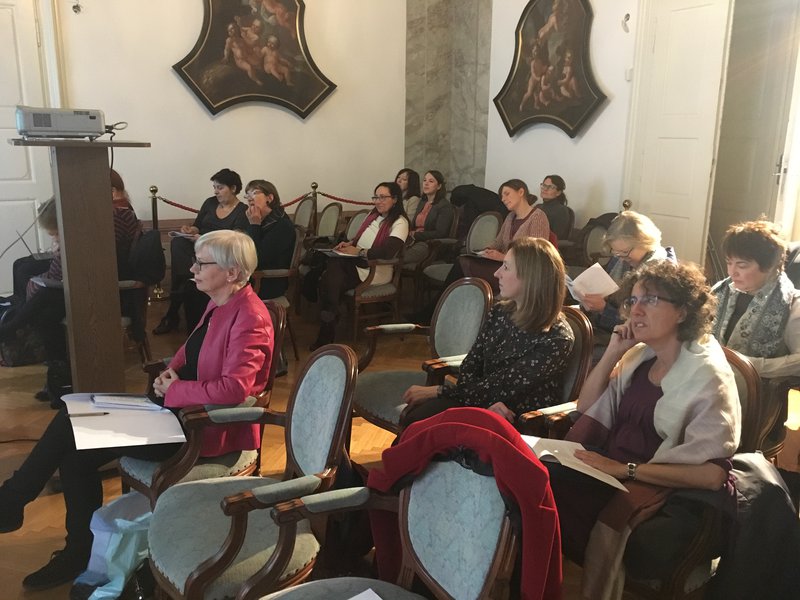Teaching Women Writers: exploring NEWW VRE possibilities
International Conference and Workshop, 16 – 17 November 2017
Conference venue: Slovenian Academy of Sciences and Arts, Novi trg 4, Ljubljana
One of the focal points of the DARIAH Working Group Women Writers in History is the connection to be created between scholarly research about early women’s authorship and teaching (both academic and secondary). Teaching covers a wide range of activities, from using outcomes of the research to contributing to it.
We think indeed that students could be given a more important role than the rather passive one they are allowed to have now. Besides, given the important number (over 6000) of women authors discovered up to now and accumulated in our NEWW Virtual Research Environment, we have to enlarge the group of active collaborators. And most importantly, it now seems possible to have the collaboration of students – in the classroom or as trainees – and seniors as “citizen scientists”. They can, much more than before, participate in scholarly enterprises like ours, considering that so much textual material (including those by and about women authors; including also the periodical press) is now available online.
For the moment this availability is still in part theoretical, as often texts are just put there as a complete mess, each of the texts lacking their historical context. By integrating them in our NEWW VRE we can provide them with a rigorous structure, and give the texts their “logical” place within the literary communication as going on at an international scale.
During the last four years, thanks to our European HERA Travelling TexTs project, this NEWW VRE was developed and reworked, as the successor of the WomenWriters Database (first version of which was opened in 2002). There are much more possibilities now – in particular for creating this connection between research and teaching. On a practical level this will also require some supplementary features. Both the possibilities and the technical requirements will be discussed during this conference.
Colleagues (researchers as well as teachers) from Slovenia and abroad (working on women’s authorship between the Middle Ages and the early 20th century), present as well as future members of DARIAH WWIH are invited to take part in these discussions.
Programme committee:
- Prof. Katja Mihurko Poniž, University of Nova Gorica
- Assist. Prof. Aleš Vaupotič, University of Nova Gorica
- Prof. Amelia Sanz, Complutense University of Madrid
- Dr. Suzan van Dijk, Huygens Institute fort he History of the Netherlands, Amsterdam
The conference is organized by the DARIAH Working Group Women Writers in History, by the University of Nova Gorica and by the Slovenian Comparative Literature Association.
Conference programme
16 November
9.00-11.00
Welcome
Katja Mihurko Poniž and Aleš Vaupotič (University of Nova Gorica, Slovenian Comparative Literature Association)
Session 1: Research in female authorship and the use of digital tools (chair: Marie Nedregotten Sørbø)
Suzan van Dijk (Huygens Institute for the History of the Netherlands, Amsterdam): The NEWW VRE: a research tool recently further developed (HERA TTT) and tested by colleagues and trainees
Päivi Lappalainen and Viola Parente-Čapková (University of Turku): Transnational Reception of Nordic Women Writers in Finland at the fin de siècle: conclusions drawn from HERA TTT research
Zsuzsana Varga (University of Glasgow): Growing up digital—women’s writing and the development of the digital sphere
Beatrijs Vanacker (University of Leuven): Authorial self-fashioning and networks of authority: some notes on Isabelle de Charrière’s and Fanny Burney’s letters
11.00-11.30 Coffee/Tea break
11.30–13.00
Session 2: NEWW VRE in the classroom I (chair: Amelia Sanz)
Milena Mileva Blažić (University of Ljubljana): Slovenian Women Fairy Tale Writers on Wikiversity — Case Study Josipina Turnograjska
Ursula Stohler (University of Basel): Teacher education and the use of the NEWW VRE
Séverine Genieys-Kirk (University of Edinburgh): Teaching early modern French women writers at undergraduate level in the University of Edinburgh: challenges and strategies
13.00-14.00 Lunch
14.00–15.30
Session 3: NEWW VRE in the classroom II (chair: Biljana Dojčinović)
Marie Nedregotten Sørbø (Volda University College): The NEWW VRE as a resource for Bachelor and Master theses: A Norwegian test case (outcome of HERA TTT)
Carme Font (Autonomous University of Barcelona ): In-depth connections: using the NEWW VRE to enhance interpretation in research about women’s writings
Amelia Sanz (Complutense University Madrid) and Eve-Marie Lampron (University of Quebec in Montreal): Teaching Women Writers in History: tested experiences, and implications for digital tools
15.30-15.45 Coffee/Tea break
15.45 -18.00
Session 4: Presenting women writers to the larger audiences, thanks to digital tools (chair: Viola Parente-Čapková)
Kerstin Wiedemann (University of Lorainne): Between fame and oblivion: reception discourse and literary career through the example of the German writer Ricarda Huch (1864-1947)
Isabel Lousada (New University of Lisbon): Claudia de Campos (1859-1916) – Learning from her – teaching for all
Biljana Dojcinovic (University of Belgrade): Digital platform and more creative learning
Narvika Bovcon (University of Ljubljana) and Aleš Vaupotič (University of Nova Gorica): Women Writers Database and Virtual Research Environment Beyond the Curricula of Literary Scholarship
18.00 Closing words and first comments
19.00 Concert: Josipina Turnograjska’s songs: Aleksandra Naumovski Potisk/Martina Burger
20.00 Conference dinner
17. november
WORKSHOP: WORKING IN THE TOOL
Each of the participants will be asked to create or edit, during this day, at least 25 records – on the three levels: author, document, reception. There will be plenty of room to discuss and (hopefully) solve problems. The two sessions will be directed by Beatrijs Vanacker and Suzan van Dijk.
9.00–11.00 Hands-on session I: creating authors and documents
Brief introduction, distribution of the Instructions, records to be made which are directly related to your and our common research issues.
11.00–11.30 Coffee / tea break
11.30–13.30
Presenting each other the results, and explaining the relevance for your research
13.30–14.30 Lunch
14.30–16.00 Hands-on session II: creating reception documents
16.00–16.15 Coffee / tea break
16.15–18.00
Technical and development issues such as use of the CLARIN-NL COBWWWEB code for connections between NEWW VRE and other projects (such as Knjiženstvo, RECIRC, Robinsonades, etc.); contacts with other DARIAH WGs, Creative industry, etc.). But also: technical problems experienced when working in the NEWW VRE.
Presenting each other the results, and explaining the relevance for your research.
http://www.dariah.eu/news/dariah-news/details.html?tx_news_pi1[news]=456
*** *** ***
Hotels in Ljubljana located in the walking distance from the conference/meeting venue:
Hotel Emonec
http://www.hotel-emonec.com/
Galeria River
https://www.galeriariver.com/
City Hotel Ljubljana
https://www.cityhotel.si/
Hotel Park – Urban Green
http://www.hotelpark.si/
Adora Hotel
https://www.adorahotel.si/
Antiq Palace
http://www.antiqpalace.com/
Art Hotel
http://www.epiceco-hotels.com/en/hotels/art-hotel-ljubljana.html/
Guest house Stari Tišler
http://www.stari-tisler.com/en/rooms
Hotel Center
http://www.hotelcenter.si/HotelCenterWeb/default.aspx
Hotel Mrak
http://hotelmrak.si/
Allegro Hotel
http://www.allegrohotel.si/?lang=en



